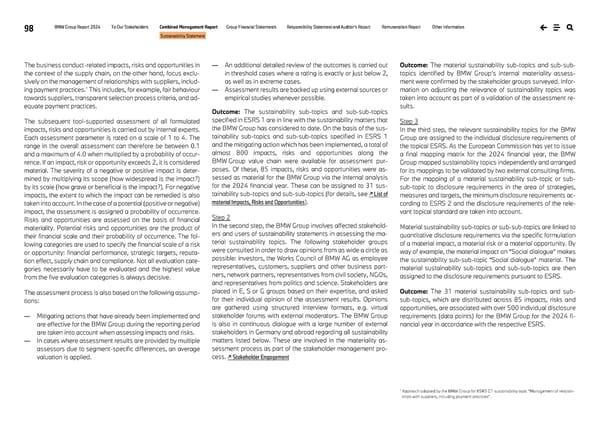98 BMW Group Report 2024 To Our Stakeholders Combined Management Report Group Financial Statements Responsibility Statement and Auditor’s Report Remuneration Report Other Information Sustainability Statement The business conduct-related impacts, risks and opportunities in the context of the supply chain, on the other hand, focus exclu- sively on the management of relationships with suppliers, includ- ing payment practices.* This includes, for example, fair behaviour towards suppliers, transparent selection process criteria, and ad- equate payment practices. The subsequent tool-supported assessment of all formulated impacts, risks and opportunities is carried out by internal experts. Each assessment parameter is rated on a scale of 1 to 4. The range in the overall assessment can therefore be between 0.1 and a maximum of 4.0 when multiplied by a probability of occur- rence. If an impact, risk or opportunity exceeds 2, it is considered material. The severity of a negative or positive impact is deter- mined by multiplying its scope (how widespread is the impact?) by its scale (how grave or beneficial is the impact?). For negative impacts, the extent to which the impact can be remedied is also taken into account. In the case of a potential (positive or negative) impact, the assessment is assigned a probability of occurrence. Risks and opportunities are assessed on the basis of financial materiality. Potential risks and opportunities are the product of their financial scale and their probability of occurrence. The fol- lowing categories are used to specify the financial scale of a risk or opportunity: financial performance, strategic targets, reputa- tion effect, supply chain and compliance. Not all evaluation cate- gories necessarily have to be evaluated and the highest value from the five evaluation categories is always decisive. The assessment process is also based on the following assump- tions: — Mitigating actions that have already been implemented and are effective for the BMW Group during the reporting period are taken into account when assessing impacts and risks. — In cases where assessment results are provided by multiple assessors due to segment-specific differences, an average valuation is applied. — An additional detailed review of the outcomes is carried out in threshold cases where a rating is exactly or just below 2, as well as in extreme cases. — Assessment results are backed up using external sources or empirical studies whenever possible. Outcome: The sustainability sub-topics and sub-sub-topics specified in ESRS 1 are in line with the sustainability matters that the BMW Group has considered to date. On the basis of the sus- tainability sub-topics and sub-sub-topics specified in ESRS 1 and the mitigating action which has been implemented, a total of almost 800 impacts, risks and opportunities along the BMW Group value chain were available for assessment pur- poses. Of these, 85 impacts, risks and opportunities were as- sessed as material for the BMW Group via the internal analysis for the 2024 financial year. These can be assigned to 31 sus- tainability sub-topics and sub-sub-topics (for details, see ↗ List of material Impacts, Risks and Opportunities). Step 2 In the second step, the BMW Group involves affected stakehold- ers and users of sustainability statements in assessing the ma- terial sustainability topics. The following stakeholder groups were consulted in order to draw opinions from as wide a circle as possible: investors, the Works Council of BMW AG as employee representatives, customers, suppliers and other business part- ners, network partners, representatives from civil society, NGOs, and representatives from politics and science. Stakeholders are placed in E, S or G groups based on their expertise, and asked for their individual opinion of the assessment results. Opinions are gathered using structured interview formats, e.g. virtual stakeholder forums with external moderators. The BMW Group is also in continuous dialogue with a large number of external stakeholders in Germany and abroad regarding all sustainability matters listed below. These are involved in the materiality as- sessment process as part of the stakeholder management pro- cess. ↗ Stakeholder Engagement Outcome: The material sustainability sub-topics and sub-sub- topics identified by BMW Group’s internal materiality assess- ment were confirmed by the stakeholder groups surveyed. Infor- mation on adjusting the relevance of sustainability topics was taken into account as part of a validation of the assessment re- sults. Step 3 In the third step, the relevant sustainability topics for the BMW Group are assigned to the individual disclosure requirements of the topical ESRS. As the European Commission has yet to issue a final mapping matrix for the 2024 financial year, the BMW Group mapped sustainability topics independently and arranged for its mappings to be validated by two external consulting firms. For the mapping of a material sustainability sub-topic or sub- sub-topic to disclosure requirements in the area of strategies, measures and targets, the minimum disclosure requirements ac- cording to ESRS 2 and the disclosure requirements of the rele- vant topical standard are taken into account. Material sustainability sub-topics or sub-sub-topics are linked to quantitative disclosure requirements via the specific formulation of a material impact, a material risk or a material opportunity. By way of example, the material impact on “Social dialogue” makes the sustainability sub-sub-topic “Social dialogue” material. The material sustainability sub-topics and sub-sub-topics are then assigned to the disclosure requirements pursuant to ESRS. Outcome: The 31 material sustainability sub-topics and sub- sub-topics, which are distributed across 85 impacts, risks and opportunities, are associated with over 500 individual disclosure requirements (data points) for the BMW Group for the 2024 fi- nancial year in accordance with the respective ESRS. * Approach adopted by the BMW Group for ESRS G1 sustainability topic “Management of relation- ships with suppliers, including payment practices”.
 BMW Group Report 2024 Page 97 Page 99
BMW Group Report 2024 Page 97 Page 99